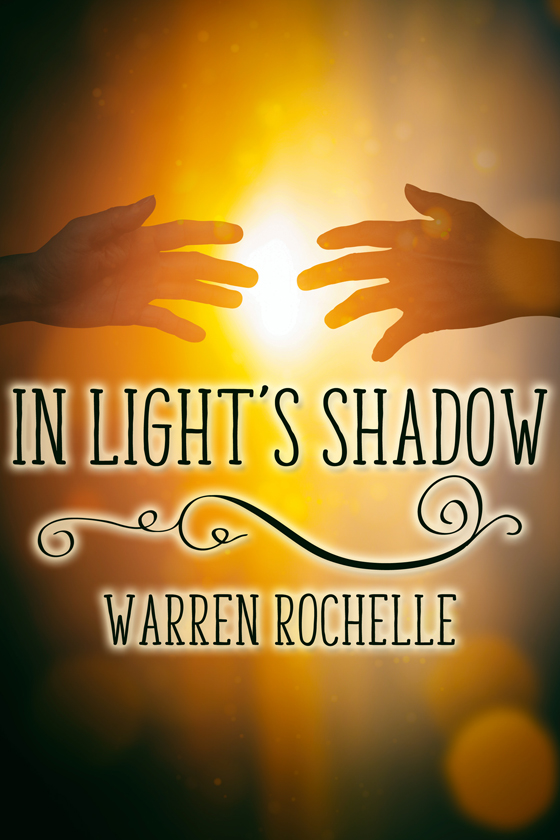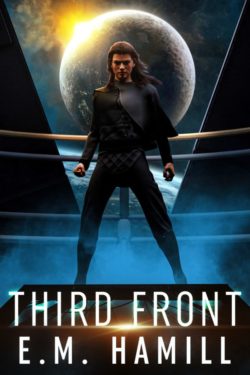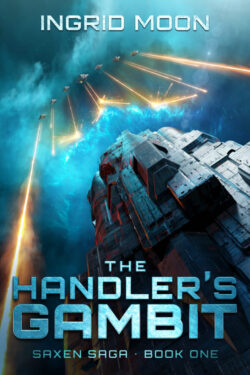A Fairy Tale
by

Gavin Booker, a school librarian at Cooper Road Elementary, Raleigh, Northern Carolina, leads an orderly, normal life. Work, jogging, friends from work, his son every other weekend. Gavin is also a secret. He is a hybrid, or part-fairy, and in the Columbian Empire, hybrids are under an automatic death sentence. Magic is illegal. So is loving another man, another capital crime. Fairies are locked away in ghettoes, magical beasts, such as gryphons, unicorns, and pegasi are kept in zoos. The others, the tree and water spirits, the talking beasts, fauns, and the rest, are in hiding. This is the world in which Gavin grew up. He survived, thanks to his mother. He can never forget he is different: ministers preach against people like him constantly; hating the other is a part of every school’s curriculum.
But now, things are changing fast, and apparently, for the worst. Earthquakes, volcanoes, killer storms are all frequent occurrences. The medicine Gavin takes to suppress his body’s glowing, isn’t working. The spells cast by his doctor, a witch, are losing their power. If anyone finds out what Gavin is, he is dead. Under threat, the Empire always goes after its marginalized people. Can Gavin survive the coming catastrophe? Will he ever recover from losing the boys he loved? Can he find the fairy man who has haunted his dreams all his life before it is too late? Can his scarred heart ever heal?
- 2 To Be Read lists
Publisher: JMS Books, LLC
Editors:
Genres:
Word Count: 99000
Setting: Central North Carolina
Languages Available: English
Word Count: 99000
Setting: Central North Carolina
Languages Available: English
The name on the sign by the empty cage read Equus caballus malum. No government-authorized sign would ever have any reference to human for a centaur. His mother had taught him the other name that morning beneath the Big Trees.
A pair of golden gryphons, also with clipped wings, and as unhappy looking as the pegasi, were in the next cage.
“There are supposed to be two silver gryphons, too,” Gavin said, after he read the sign. “I guess they are hiding in that cave in the back. Maybe the female is sitting on her eggs, or nursing her cubs.”
Latisha just nodded and tightened her grip on his hand. God only knows what her parents told her before this field trip.
READ MOREThe werewolf was next, sitting hunched over a rock in its forest habitat. It was an eastern red werewolf, with intensely blue human-like eyes. Listed on the sign in front of the cage were instructions for identifying werewolves in human form, and ways to protect oneself from such monsters. Canis lupus malum, evil wolf.
The werewolf seemed even sadder than the rest of the Bestiary’s denizens. It hadn’t looked up, no matter how loud the kids ahead of Gavin and Latisha had been, or how many faces they had made. But it did look up just as Gavin got to the cage and stared at him with those very bright blue eyes. Human eyes. Homo sapiens lupus. Gavin froze.
“Mr. Booker?”
He didn’t answer Latisha at first. Instead, Gavin watched as the werewolf, shaking its big shaggy head, came slowly over to the corner of the cage where they stood. Its eyes were focused intently on Gavin. It jumped on its hind legs, its big paws only separated from Gavin’s face by the glass.
“Help me, please, fairy, help me. They won’t me let change. They make me take drugs,” it said in a rough voice. “I need to change. Get me out of here.”
“I’m not a fairy. Shut up,” Gavin snapped back.
“Mr. Booker? Look, the silver ones came out,” Latisha said. She was staring at the gryphon cage. She turned when the werewolf asked again for the fairy to get him out. “Mr. Booker? What’s it talking about? What fairy?” Latisha asked, looking back and forth between the silver gryphons and the werewolf. The silver gryphons ran back in their cave.
“Not a fairy? Look at your hands, fairy,” the werewolf hissed.
Gavin dropped Latisha’s hand and looked at his own. The tips of all his fingers glowed, a faint, faint yellow glow, as if he had dipped them in fluorescent paint. He quickly slid them into his pockets.
I took the pills this morning. This shouldn’t be happening. Suppress, suppress, suppress.
“I’m not a fucking fairy,” he yelled at the werewolf who only growled and snarled in return. He looked quickly around the Bestiary. Was there anybody who’d hear him yelling? What was he thinking? Thank God nobody but Latisha was anywhere near Gavin and the werewolf.
Latisha stared at Gavin and the werewolf. “You aren’t supposed to say that word; it’s not nice. Mama told me so. What fairy is it talking about?”
Gavin took a deep breath. Seeing the fear in the little girl’s face, he spoke slowly, in as even and as calm a tone as he could muster. “I don’t know what fairy it's talking about. There's just you and me and we're certainly not fairies.” The glowing had stopped, he felt it. He took a deep breath. “I’m sorry I got upset—that thing upset me. Your mother is absolutely right; you shouldn’t say that.”
"Fairies are bad, too," Latisha said. He could guess what she was thinking. Latisha was remembering what she had been taught in school, the same things he had been taught in kindergarten and first grade, in Sunday school, and all the way through high school and college. Never mind the ads on TV and that radio that played over and over. The government made sure the lesson got through, that it was repeated over and over so no one could ever miss it. Even the youngest knew what the warning signs were, what to look out for. And what to do if they saw glowing people.
For your country and your Emperor, for God, for your family and friends, and because Jesus loves you: call the police. Just hit the big blue star on the nearest Automatic Reporting Machine and start talking. If you don’t know how to use the phone or the ARM, or neither is nearby, find the nearest normal adult and tell them. Normal people, good people, do not glow.
“Fairy, please. Help me.”
Gavin ignored the werewolf. “It’s not supposed to talk to us. Let's go find Mr. Phillips and the rest of the class."
Latisha nodded and reached for his hand. They walked away quickly, not looking back.
The werewolf yelled. “Fairy, help me, please!” Then it howled. They walked faster, Latisha looking over her shoulder.
COLLAPSEDan on Lovebytes wrote:Love Under the Iron Heel
5 Stars
This dystopic urban fantasy blends a sweet m/m romance, a coming-of-age story, and a horrific alternate-history world. Magic and magical creatures exist, although throughout the history of this world’s United States, the Columbian Empire, they have been progressively more restricted and then criminalized. Even a hint of returning the “the Relaxation” is enough to ignite assassination attempts. Meanwhile, fairies are locked away in ghettoes or have gone into hiding, and magical beasts, such as gryphons and unicorns, are kept in zoos. Hand in hand with oppression of magical beings comes proscriptions against same-sex relationships and freedom of speech. Church, school, and state unite in systematic brainwashing and instilling fear and hatred for anyone who deviates from a rigidly conformist norm.
Gavin Booker has grown up in such an environment. His half-fairy mother was so traumatized by discrimination that she has become pathologically secretive. Although “passing” for human-normal by marriage, she imparts her paranoid to Gavin. He has always known he was different, but with the stirrings of his earliest childhood attraction to other boys, his very life is now at risk. His mother is terrified that such close friendships may cause them both to be revealed as hybrids, and she pressures him to “pass” as straight. At the same time, she takes him to a healer who dispenses medicines to suppress the beautiful golden glow of fairies and teaches him psychological suppression methods.
Gavin’s life becomes one of unending denial of his deepest feelings and his true nature. The price of exposure is not just immediate public execution without trial. It has consequences for the family and friends of the accused. Suicides by gay, fairy youth are rampant, and Gavin himself, a teenager drowning in despair, attempts to end his own life. One of the few consistent bright spots in his world is his relationship with a golden fairy boy who visits him in dreams. Their emerging love and sexual bonding sustain Gavin through the deaths and disappearances of every other boy he’s cared about.
The Columbian Empire is alarmingly like our own United States. Rochelle fleshes out Gavin’s daily life with details like news reports by Walter Conkrite, popular obsession with “the royals,” and almost-accurate bits like Aaron Copeland’s “Appalachian Summer” (my favorite)
Rochelle’s portrayal of the intense psychological devastation of unrelenting fear, the toxic nature of secrets, and the impact upon self-esteem is chillingly accurate. I grew up in the 1950s, when my father was the target of a McCarthy Era probe and a lawsuit brought by the Justice Department to take away his citizenship. Although I was too young to know about the FBI surveillance of our family or the relatives who went “underground,” I have vivid memories of the anxiety my family endured. Yet even in those dreadful times there were beacons of light: friends, family members, sympathetic and courageous attorneys, organizations like the ACLU, labor unions, and Quaker and other religious groups who, often at great risk to themselves, stood up for the rights of those under suspicion.
Although in Rochelle’s world, there is an underground of sorts, I found the absence of public resistance disappointing. The Columbian Empire arises from the same traditions of rights and limits on power as the United States today, dating back to the Magna Carta and earlier. At the same time, the unrelenting targeting of both gays and hybrids is an important dramatic element in how much it intensifies the pressure on Gavin and others.
One of the strengths of this book is how many different ways a reader can look at it. Certainly, it’s a gay love story. It’s also a psychological and political thriller. It’s an examination of the corrosive effects of ignorance and hatred. In all these areas, it has broad appeal.
**content warnings – attempted suicide, rape, slaughtering people in the street, brutality, death of main characters, kidnapping
I’m kind of at a loss for words on this one. I totally missed the first line of the second paragraph of the blurb and assumed this was a fantasy novel. Well, it wasn’t. Instead, it was a journey through an alternate history version of the United States where North and South America were named for Columbus instead of Amerigo Vespucci. Teddy Roosevelt was declared the first Emperor in the early 1900s and a church rose to power. The church being a fanatical, anti-anything but ‘normal’ individuals, meaning white straight church goers. Everyone else is marginalized. In this world, the mythological species are not myths, but they have been hunted to extinction (the vampires) or driven underground (the fairies and most others) or are in hiding.
Our hero in the story is a young man named Gavin Booker and the story bounces backwards and forwards through his life explaining his story. Gavin is a ¼ fairy through his mother who has been able to mask her ½ fairy self through drugs. Fairies glow when excited or several other things. When Gavin’s father (a normal) finds Gavin glowing, he grabs his other two sons and leaves. We discover shortly thereafter that the brothers both are also starting to glow, but we never again in the story hear what happened to them.
I put this book down a few times because it was truly disturbing in spots. If you were a ‘para’, the slang word for a part fairy, you could be killed on sight. One woman in the grocery store was glowing gray (which we learn means she was sick) and she is dragged out into the parking lot and shot. The rule is when one of ‘them’ is shot, leave the blood on the ground as a warning. Gavin, as he matures and grows, develops feelings and a relationship with another young ¼ fairy. What happens when that young man is unmasked as a para will haunt Gavin through the rest of the story. And trust me, it haunted me. That was one of the spots that I put the book down and read something else.
The brutal parts of the book really bothered me. I’m trying not to do spoilers, but the repeated disregard for life in regard to the part fairies, the prison/ghettos that the fairy folk are forced into, the wiping out of entire Native American tribes, the repeated attempted suicides, the off-page memory of the rape of a 12-year-old girl before she was murdered, and lest I forget to mention, homosexuality is of course against the rules, and you can be shot if even suspected of such a heinous crime. Those, and many other things made this book very difficult to read. But I kept picking the book back up and finally forced myself to read it because I had agreed to read it and give an honest review.
In my opinion, there are some parts of the story which didn’t really reach closure. I’m not sure if the author is contemplating a sequel or not. For example, there is another major character who is another love interest of Gavin who was taken away on a blacked-out bus with tons of other people mid-way through the story. We don’t know what happened to him. And there was that thing Gavin’s mother did… can she ever be forgiven? Is it even forgivable?
I really didn’t enjoy this book. It was disjointed with the forward and backwards jumping timelines. I didn’t like the brutality. The fact that there are notes at the end of the book directing interested individuals to suicide prevention sites, did not in any way make up for the on-page suicide attempts. When it comes to recommending a book, I think of whether I would tell a close friend to read it. This one I wouldn’t be able to recommend. Therefore, I’m giving it a 3.0 for an average book since it was well enough written and edited. It just isn’t anything I would want to read more of.
RATING:
3 Stars






